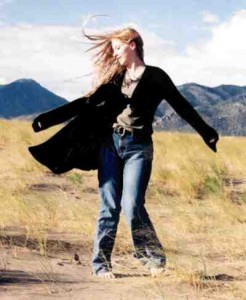Review by Virginia McConnell Simmons
Poetry – April 2007 – Colorado Central Magazine
As If the World Really Mattered
by Art Goodtimes
Published in 2006 by La Alameda Press
ISBN 1888809493
LONG AGO Robert Frost commented that “writing free verse is like playing tennis with the net down.” It is hard to imagine, then, what he might say about today’s performance poetry festivals, bouts, slams, contests, circuses, and open mike sessions that literary traditionalists view with considerable skepticism and suspicion, if not dismay.
The author of this collection of poems is Art Goodtimes, the somewhat eccentric, basket-weaving, Green Party, three-term commissioner of San Miguel County from Norwood, Colorado, who is described as a performance poet — quite enough to cause some prospective readers to approach this volume with skepticism and suspicion. Moreover, the front cover of the book has a colorful illustration depicting Goodtimes as a clown or gnome, perhaps a Hobbit, while the back cover is laden with ecstatic tributes penned by his admirers from Hobbitland.
Opening the book to the introduction, skeptics will not be reassured, for it is called an “Invocation,” suggesting that the verses which follow will be the holy writ of a cult. The writer of the introduction, Dolores LaChapelle, proffers the remarkable notion that the natural world shares the same consciousness as that possessed by human beings, which may cause rationalists to simply throw the book out without ever reading a line of the poems. To do so would be a mistake, however.
Goodtimes’s opening line asks, “If we lived as if all that whirled really mattered,/ mirabile dictu,/ what strange shape would our lives take?” His poems answer that question with personal experiences and reflections, which bear little resemblance to Hobbitland. During this particular journey, the reader accumulates meaning in his individual experiences and musings that become universal in their meaning. Such poems as “Roadkill Coyote” evoke emotional responses that are not dependent on the reader’s having actually known identical experiences. “Basketweaving,” on the other hand, reveals how a county commissioner endures meetings by “matching fixed attention with free intention,” by a unique means that a few readers may wish they had the courage to emulate. The closing poem, “Kehoe Beach,” is a powerful expression of the forces of nature in which we all exist.
Often, but not always, Goodtimes’s style is better suited to oral performance, particularly when word repetitions take on a wooden quality on the printed page, or when prose-like lines seem to be broken up to simulate poetry, as they appear to be in “Pilot Light,” “Hayduke Lives,” “Believe Edward Teller,” and others. In such instances, when Goodtimes is playing tennis with the net down as Frost would say, an oral performance might be more effective, as it could be aided by vocal intonation and body language.
Also, readers of poetry who believe that explication should be based strictly on what a poem says and nothing more may be annoyed to find occasional foreign words and phrases (even Greek) requiring translations that are found in Goodtimes’s 12 pages of notes that follow his 90 pages of verse. These are neither footnotes nor endnotes, but are, in fact, little essays that tell the reader more about his biography, associates, and erudition. In our current age of fascination with celebrities, some of these glimpses into Goodtimes’s personal life may be of interest, but they should not be required as supplements to the poems themselves. Still, they will appeal to readers who are curious about this unusual figure who is perennially a favorite at Headwaters Conferences in Gunnison.
The University of New Mexico Press is distributing this collection of poems for La Alameda Press.


